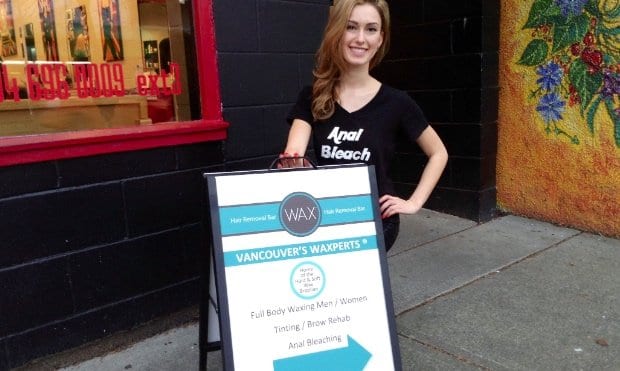Despite accusations of child exploitation and racial discrimination, one East Vancouver aesthetic salon owner says she won’t be bullied into censoring her store’s sidewalk sandwich board that, among other things, advertises anal bleaching.
Jaden Stevenson, owner of the Wax Hair Removal Bar on Commercial Drive, says that since the store opened Feb 1 she has received several complaints from women in the neighbourhood offended by the signage.
“It’s Commercial Drive,” she says, surprised by the backlash. “I thought this was a more liberal community. I thought we’d be praised rather than bullied.”
Stevenson says the complaints have ranged from concern over public use of the word “anal” that may have to be explained to children walking to nearby schools, to messages about body image and racial whitewashing.
“We had an African American woman state that she was offended. She was offended that we bleach skin at all,” Stevenson says. “And I can’t really argue that as I’m a little white girl with no kids. It’s awkward.”
But Stevenson maintains there is demand for anal bleaching, which is second most popular among Wax Bar’s services, behind the Brazilian wax.
Anal lightening or anal bleaching is when the skin around the anus is chemically lightened to better blend with the skin around the anal area. A darkening of skin pigment around the genital and anal region is often attributed to age or hormonal changes. Stevenson says Wax Bar uses an all-natural plant-derived product for the service.
Wax Bar only offers anal bleaching to adults, she notes; anyone under the age of 18 is denied the service.
Stevenson says despite the uproar over anal bleaching, she feels a duty to be open and honest in response to inquiries. “I tell the young girls that come in and ask about it that it’s a service that adults do sometimes. They just think it’s weird. They don’t really care about it,” she says. “I feel that kids are less innocent than people think most of the time.”
Some parents are less trusting.
Xtra requested interviews with three women who contacted the store to express their concerns. One called back but could not be reached again for comment. The other two refused to be interviewed by phone. However, the complainant who calls herself Tanya Van told Xtra in an email March 18: “This is only about the advertising on the sandwich board 100 steps away from the elementary school, not about anal bleaching. They [Wax Bar] could easily call it ‘body bleaching’ on the sandwich board.”
But in a Feb 11 email to Wax Bar, Van, who claims to be a member of the Parents Advisory Committee at Britannia elementary school, says the anal bleaching ad is “grooming young students” for “child exploitation.”
“We feel that this phrase ANAL BLEACHING on the sandwich board on the way to school to be potentially grooming our young students that walk by it every weekday for child exploitation. This is how it starts — breaking boundaries — it is called grooming,” she writes.
“We teach our children to not allow anyone to touch their private parts so do you understand the frustration and upset this is causing in our community that live here with their kids and use the businesses of the Drive and services at Britannia to have to walk by this sign?” she continues.
“How do we even begin to talk to our kids about it?” she asks.
“Children of this age fixate on signage to learn to read,” another woman emailed Wax Bar. “Having to explain what ‘anal bleaching’ is to a 4-year-old is difficult and undesirable, but having your signage there where the children see it on their walk to school every day makes it unfortunately necessary.”
Van accused Wax Bar of racial discrimination as well.
“Britannia has a large majority of Aboriginal students,” she writes. “This ANAL BLEACHING sign is really insidious way to get the message to these young dark skinned students that they don’t fit in — that even their nooks and crannies are too dark. Bleach for whitening the skin.”
Wax Bar founder and CEO Luba Sasowski defends Stevenson, rejecting the accusation of child exploitation and balking at the opinion that anal bleaching is racially insensitive.
“To say that the advertising of this service is an insidious way of sending the message that dark skinned people don’t fit in closes open communication and hampers the efforts of all those people who have tried to educate people in hopes to increase acceptance for all things that don’t hurt others,” Sasowski writes in an emailed reply to Van.
“This is as ridiculous as saying all barber shops need to take down their ‘Hair Cut Inside’ signs because it’s an insidious way of sending a message to Sikh men that they don’t fit in,” she adds.
In response to the dispute, Stevenson says she initially put white tape over the ‘anal bleaching’ line on the salon’s sandwich board, but then reconsidered.
“A lot of people think it [anal] is a taboo word,” Stevenson acknowledges. “We don’t find it is a bad word. We find it’s a body part and if a child asks then we tell them it’s a body part and that we provide an adult service.”
Stevenson says she’s not planning to remove the signage.
“I feel like if your children see the signage and they automatically think that they have to bleach their anus then that’s a conversation that parents should have with them,” she says.

 Why you can trust Xtra
Why you can trust Xtra


